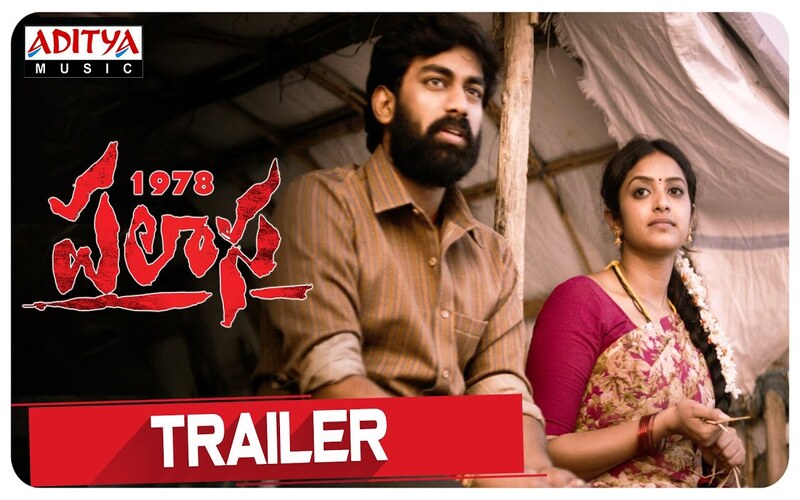
Introduction
“Palasa 1978” is a 2020 Telugu-language crime drama directed by Karuna Kumar. The film, set in the late 1970s in a rural Andhra Pradesh town, tells the story of caste oppression, political conflicts, and the violent transformation of an oppressed man into a revolutionary. Unlike mainstream commercial films, Palasa 1978 presents a raw and realistic portrayal of societal issues, making it a compelling watch for audiences who appreciate thought-provoking cinema. With its gripping screenplay, intense performances, and a powerful social message, the film gained attention despite its limited budget. This article provides an in-depth review, an overview of the star cast, IMDb ratings, the film’s budget, and its overall box office performance.

Honest Review of Palasa 1978
One of the standout aspects of Palasa 1978 is its unique setting and realistic storytelling. The film is deeply rooted in the social realities of caste-based discrimination and oppression, which were prevalent in rural India during the late 1970s. Unlike typical masala films, Palasa 1978 takes a serious approach to its narrative, offering an unfiltered look at the struggles of the underprivileged.
The story revolves around Mohan Rao, played by Rakshit, who belongs to an oppressed community. Born into a family of folk artists, Mohan initially aspires to lead a simple life, but circumstances force him into violence and rebellion. As he gets caught between the corrupt political system and the harsh realities of caste oppression, his journey becomes a compelling tale of resistance. The film effectively portrays the protagonist’s transformation from a passive observer to an aggressive revolutionary, making it a gripping watch.
Director Karuna Kumar has done a remarkable job in maintaining the film’s authenticity. The dialogues are raw and impactful, reflecting the harsh realities of that era. The screenplay is engaging, ensuring that the audience remains invested in the narrative. The cinematography by Arul Vincent deserves special mention, as it beautifully captures the rustic landscapes and raw emotions, giving the film a distinct visual appeal.
Another highlight of the film is its background score by Raghu Kunche, which perfectly complements the intense storytelling. The folk-based music and powerful sound design add depth to the film’s emotional and dramatic moments. Unlike commercial films that rely on extravagant song sequences, Palasa 1978 keeps its music subtle and meaningful, enhancing the overall impact of the narrative.
While the film has many positives, it does have a few drawbacks. The pacing in the second half slows down slightly, making some scenes feel stretched. Additionally, the excessive violence, though necessary for the narrative, might not appeal to all viewers. However, these minor flaws do not take away from the film’s overall impact.
Cast of Palasa 1978
The film features a talented cast, with each actor delivering a powerful performance.
- Rakshit – Plays the protagonist Mohan Rao, who transforms from a simple folk artist to a fierce revolutionary. His performance is intense and highly convincing.
- Nakshatra – Portrays the female lead Lakshmi, Mohan Rao’s love interest. Her role, though not extensive, adds an emotional layer to the story.
- Raghu Kunche – Plays the role of Chinna, a power-hungry politician. His negative role adds depth to the film’s conflict.
- Thiruveer – Plays Ranga Rao, an influential and cunning antagonist who uses caste politics to maintain his power.
- Laxman Meesala – Delivers a notable performance in a supporting role, adding intensity to key moments in the film.
- Prawin Yendamuri – Plays a crucial supporting role that significantly influences the protagonist’s journey.
Each actor brings authenticity to their roles, making the film feel incredibly real. The strong performances, particularly by Rakshit and Raghu Kunche, elevate the storytelling and leave a lasting impact on the audience.
IMDb Rating and Critical Reception
“Palasa 1978” received a highly positive response from critics and audiences alike. The film holds an IMDb rating of 7.7/10, which reflects its strong storytelling and impactful performances. Critics praised the film for its bold approach to sensitive social issues and its realistic depiction of caste-based oppression.
Many critics compared the film to classic revolutionary dramas, appreciating its raw intensity and gripping screenplay. The film was especially praised for breaking stereotypes and bringing an authentic regional story to the forefront. Unlike mainstream films that often dilute serious topics with commercial elements, Palasa 1978 stays true to its message, making it a critically acclaimed film.
Some viewers found the excessive violence and serious tone to be overwhelming, but most agreed that the film’s message and execution made it a must-watch. Several film analysts also highlighted how Palasa 1978 stands as a testament to the power of independent filmmaking, proving that a strong script and passionate storytelling can leave a deeper impact than big-budget commercial films.

Budget and Box Office Success
“Palasa 1978” was made on a limited budget of approximately ₹3-4 crore, a significantly lower amount compared to mainstream Telugu films. Despite this, the film managed to create a strong buzz through word-of-mouth publicity and positive reviews.
At the box office, the film had a moderate theatrical run, primarily because of its limited screen count. Since it was a small-budget film with no big star cast, its initial collections were slow. However, the film gradually picked up momentum, especially in Andhra Pradesh and Telangana, where its authentic regional storytelling resonated with audiences.
Though it did not become a massive commercial success, Palasa 1978 managed to recover its budget and make a slight profit. Additionally, its digital release on streaming platforms significantly boosted its popularity. Many viewers who missed the film in theaters discovered it on OTT platforms, where it gained a cult following. The film’s impact continued even after its theatrical run, proving that strong storytelling can overcome budget constraints.
Conclusion
“Palasa 1978” is a hard-hitting, socially relevant film that offers a refreshing departure from commercial Telugu cinema. With its powerful performances, gripping screenplay, and bold take on caste oppression, the film successfully leaves a lasting impact. Unlike formulaic films, Palasa 1978 delivers a thought-provoking experience, making it an important film in the Telugu industry.
The film’s strong IMDb rating, modest budget, and decent box office success prove that meaningful cinema can thrive even without star power. For those who appreciate intense dramas with deep social messages, Palasa 1978 is a must-watch. Its authentic storytelling, compelling characters, and hard-hitting realism make it one of the most memorable regional films in recent times.